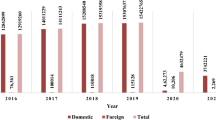Abstract
The use of participatory methods has become increasingly popular in agricultural research and development and natural resource management. A range of approaches are being used at the grassroots level in order to involve local citizens and groups in projects. Many of these activities remain peripheral and isolated from conventional development agencies and policies. However, recent efforts are evolving to link participatory approaches into wider planning and policy-making processes and to increase the influence of such methods in resource management initiatives. Main lessons from these innovative participatory experiences in addressing policy issues for sustainable development are summarized.
Similar content being viewed by others
References
Biggs, S. D. (1981). “Sources of Innovation In agricultural technology,”World Development, Vol. 9, no. 4, pp. 321–336.
Biggs, S. D. (1987). “Interactions between resource-poor farmers and scientists in agricultural research,” School of Development Studies, University of East Anglia, Discussion Paper for OFCOR research group; ISNAR study on Organization and Management of On-farm Research.
Cernea, Michael (1992). “The building blocks of participation: testing a social methodology,” paper presented at Workshop on Participatory Development, Washington, DC: The World Bank.
Chambers, R. (1983).Rural Development: Putting the Last First. Harlow: Longman.
Chambers, Robert, Arnold Pacey, and Lori Ann Thrupp, editors, (1989).Farmer First: Farmer Innovation And Agricultural Research. London: Intermediate Technology Press.
Cohen, John M. and Norman T. Uphoff (1980). “Participation's place In rural development: seeking clarity through specificity,”World Development, Vol. 8, pp. 213–235.
COMUNIDEC (1993).Manual de Planeamiento Andino Comunitario: El PAC en la Region Andina: Quito: Sistema de Investigación y Desarrollo Comunitario and the World Resources Institute.
Farrington, J. and A. Martin (1988). “Former participation In agricultural research; a review of concepts and practices.” Occasional Paper no. 9, London: Overseas Development Institute.
Fujisaka, S. (1988). “A method for farmer-participatory research and technology transfer: upland soil conservation in the Philippines”, Agricultural Economics Department, International Rice Research institute, Manila, Philippines.
Gow, David D. and Jerry Van Sant (1985). “Decentralization and participation; concepts in need of implementation strategies,” inImplementing Rural Development Projects; Lessons from AID and World Bank Experience. Boulder, CO: Westview Press.
Jiggins, J. (1988). “Farmer participatory research and technology development,”Occasional Papers In Rural Extension, No, 5, Department of Rural Extension Studies, Ontario, Canada: University of Guelph.
Norgaard, Richard (1987). “The epistemological basis of agroecology.“ In M. Altieri (ed.),Agroecology: The Scientific Basis of Alternative Agriculture. Boulder: Westview Press.
Ramon, Galo (1994). “Andean community planning — encouraging Andean rationality and bridging over to Western rationality,“Forest Trees and People, Newsletter No. 23, pp. 9–13.
Rhoades, R. E. (1984).Breaking New Ground: Agricultural Anthropology, Uma, Peru: International Potato Center.
Rhoades, R. E. and A. Bebbington (1988). “Farmers who experiment: an untapped resource for agricultural research and development,” paper presented at the International Congress on Plant Physiology, New Delhi, 15–20 February.
Rhoades, R. E. and R. H. Booth. (1982). “Farmer-back-to-farmer: a model for generating acceptable agricultural technology,”Agricultural Administration, Vol. 11, No. 4, pp. 11–13
Rocheleau, Dianne E. (1991). “Participatory research in agroforestry: learning from experience and expanding our repertoire,”Agroforestry Systems 15:111–137.
Thrupp, Lori Ann (1989), “Legitimizing local knowledge: from displacement to empowerment for Third World People,”Agriculture and Human Values, CZVO1. 6, No. 3 (Summer), 13ff.
Uphoff, Norman (1992), “Approaches and methods for monitoring and evaluation of popular participation in World Bank-assisted projects,” paper presented at the Workshop on Participatory Development, The World Bank, Washington, DC.
Warren, D. M, L. J. Slikkervear, and B. O. Titliola (1989).Indigenous Knowledge Systems, Implications for Agriculture and International Development, Studies In Technology and social Change, No. 11. Ames: Iowa State University.
Zazueta, Aaron (forthcoming in 1994).A Matter of Interests: Participation, Equity, and Institution-Building for Sustainable Development Washington, DC: World Resources institute.
Additional information
Lori Ann Thrupp is Director of Sustainable Agriculture and a Senior Associate with the Center for International Development and Environment of the World Resources Institute, Washington, DC. She has 15 years of experience in environment-development field, working mainly on sustainable agriculture, political ecology of natural resource management, environmental policy, pesticide and pest management, agroecology, environmental health, and gender issues — mainly in Latin America. Before joining WRI in 1990, Dr. Thrupp worked with the University of California Berkeley, Organization of Tropical Studies and CATIE in Costa Rica, and the Institute of Development Studies. She is a coauthor of a book entitledElUso de los Plaguicidas en Costa Rica, coeditor of a book entitledFarmer First: Farmer Innovation and Agricultural Research and author of many published articles.
Bruce C. Cabarle is a Senior Associate with WRI as well as the Director of Forestry and Land Use in the Center for International Development and Environment where he coauthoredSurviving the Cut. Mr. Cabarle serves as Vice-Chair of the Forest Stewardship Council, which is proposed as an accreditor of timber certification programs worldwide. He has over 12 years of experience in forest sector analysis, forest management, community forestry and strategic planning. Before joining WRI in 1988, Mr. Cabarle was a forester with the Puerto Rico Department of Natural Resources and the USDA Forest service in Idaho.
Dr. Aaron E. Zazueta is a Senior Associate and the Regional Director for Latin America at the Center for International Development and Environment, WRI. He works with NGOs and grassroots groups to strengthen their capacities to propose, negotiate, and carry out viable options for better resource and environmental management. Since joining The Center in 1990, Dr. Zazueta has played a major role in helping to build consensus for improving natural resource management in Mexico, Ecuador, Bolivia, and Central America. Current work includes increasing the Central American Commission of Environment and Development's capacities to plan strategically and to build consensus for solving environmental problems in the region. Prior to his current position at WRI, Dr. Zazueta lectured in Anthropology at the University of California at Davis and was a Senior Analyst at Freedom from Hunger Foundation
Rights and permissions
About this article
Cite this article
Thrupp, L.A., Cabarle, B. & Zazueta, A. Participatory methods in planning & political processes: Linking the grassroots & policies for sustainable development. Agric Hum Values 11, 77–84 (1994). https://doi.org/10.1007/BF01530448
Issue Date:
DOI: https://doi.org/10.1007/BF01530448




